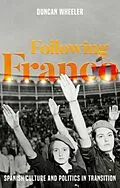The transition to democracy that followed the death of Spanish dictator Francisco Franco in 1975 was once hailed as a model of political transformation. But since the 2008 financial crisis it has come under intense scrutiny. Today, a growing divide exists between advocates of the Transition and those who see it as the source of Spain's current socio-political bankruptcy. This book revisits the crucial period from 1962 to 1992, exposing the networks of art, media and power that drove the Transition and continue to underpin Spanish politics in the present. Drawing on rare archival materials and over three hundred interviews with politicians, artists, journalists and ordinary Spaniards, including former prime minister Felipe Gonzalez (1982-96), Following Franco unlocks the complex and often contradictory narratives surrounding the foundation of contemporary Spain.
Autorentext
Duncan Wheeler
Klappentext
'Spain's transition from dictatorship to democracy could hardly have been more tumultuous, with terrorism, military subversion and political chicanery in abundance. Duncan Wheeler's fascinating, utterly original and endlessly entertaining book is one of the best introductions imaginable to a story as murky as it is uplifting.' Professor Sir Paul Preston, London School of Economics and Political Science'Studies of 1960s, '70s, and '80s Spain rarely invoke the "swinging 60s", the "me decade" or the "decade of greed". Duncan Wheeler takes the reader on a fun-driven journey through the media- and gossip-scapes of these transformative years, leaving no cultural icon unturned.'Professor Eugenia Afinoguénova, Marquette University'Following Franco takes the reader on an exciting journey through Spanish culture and politics that reaches back to Francoism and beyond. Duncan Wheeler gives an enriching and comprehensive account that allows us to understand the idiosyncrasies of contemporary Spain.'Professor Manuel Palacio, University Carlos III of Madrid Spain faces many challenges in the twenty-first century. Disillusionment with the two mainstream parties has resulted in the emergence of radical political start-ups Podemos and Vox, while the 2017 referendum on Catalan independence marked the country's worst constitutional crisis since 1981, when members of the Guardia Civil entered parliament and held democracy to ransom. In this bold and far-reaching study, Duncan Wheeler traces the roots of Spain's problems to the process of democratic transition following the death of dictator Francisco Franco in 1975. Drawing on rare archival materials and over three hundred interviews with politicians, artists, journalists and ordinary Spaniards, including former prime minister Felipe Gonzalez (198296), he revisits the crucial decades of 1962 to 1992, exposing the networks of art, media and power that drove the Transition and continue to underpin Spanish politics today.
Inhalt
IntroductionPart I: CelebrityIntroduction1 Fandom and mass-culture in late-Francoist Spain: Manuel Benítez 'El Cordobés' and Raphael2 Aristocracy and generational change: The houses of Alba, Franco and Bourbon 3 ¡Hola! in the age of champagne socialism: Isabel Preysler, Miguel Boyer, Julio Iglesias, Francisco Rivera 'Paquirri' and Isabel PantojaPart II: CensorshipIntroduction4 The regulation of cultural production during and after Manuel Fraga (196275)5 Key performance indicators: Democratisation and freedom of speech (197581)6 The regime of '81: Patronage and permissivenessPart III: CitiesIntroduction7 Urbanisation and development: Class, gender and race8 The Movida and the reinvention of Madrid 9 An Olympic renaissance: The Barcelona modelPart IV: CommunitiesIntroduction10 Culture as a democratic weapon: Pablo Picasso's Guernica11 The historical nationalities: Culture and community in the Basque Country, Catalonia and Galicia12 What qualifies as Spanish culture? The State, autonomous communities and the culture warsConclusionNotes Select bibliographyIndex
